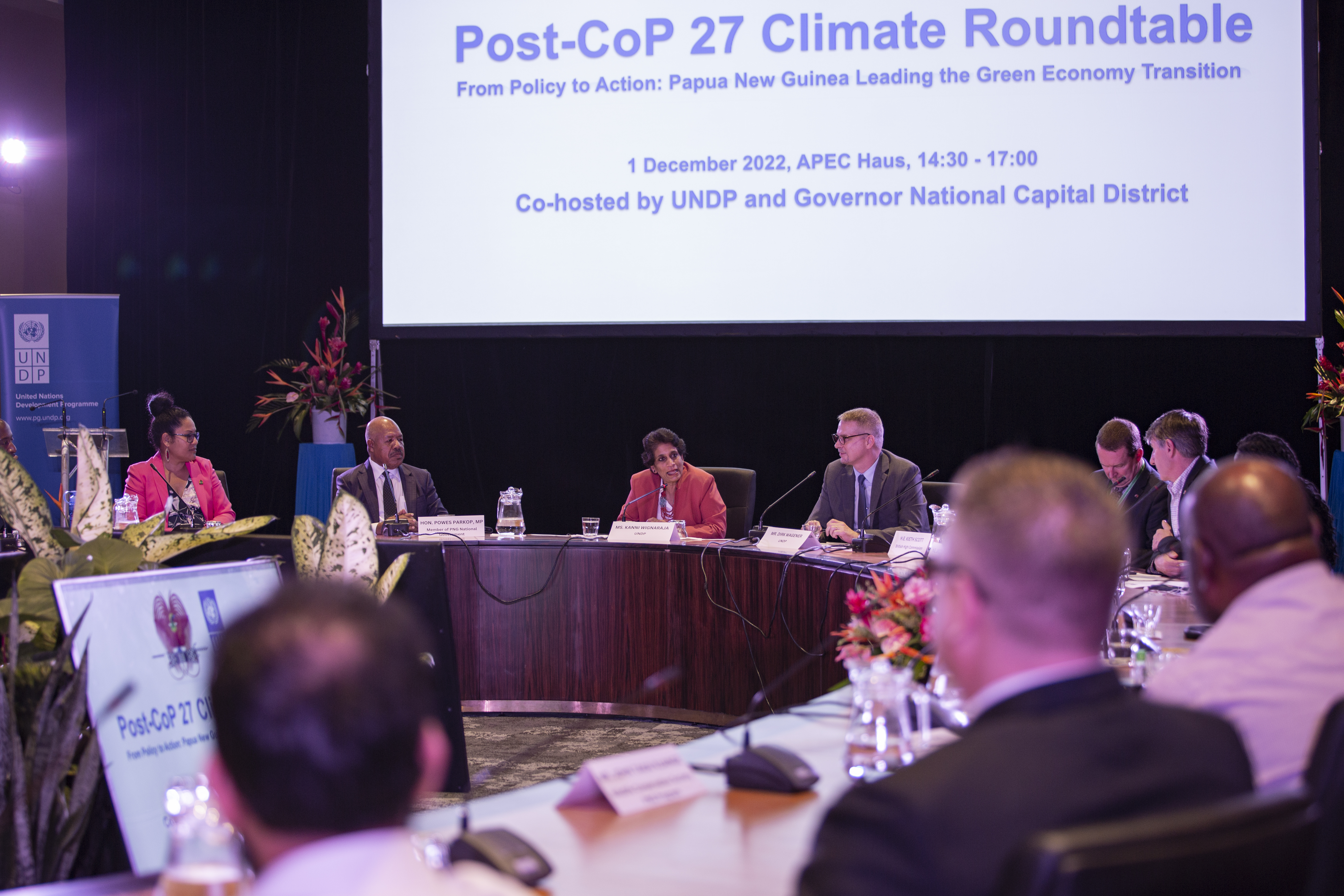Dirk Wagener, United Nations Development Programme Resident Representative, today in partnership with the Hon. Governor Powes Parkop, proudly hosted a post-COP 27 Roundtable Event at APEC Haus, Port Moresby.
UNDP Hosts Post COP 27 Climate Roundtable in Port Moresby
December 1, 2022

The Post-COP27 Climate Roundtable was held at the APEC Haus. United Nations Assistant Secretary-General, UNDP Assistant Administrator and UNDP Regional Director for Asia and the Pacific, Ms. Kanni Wignaraja gave the keynote address.
The Roundtable considered what lies ahead for Papua New Guinea following COP 27 as it continues to step up action on climate change. As the world looks to COVID-19 recovery and navigates growing global uncertainty, the Roundtable debated, among other issues, how to drive the green economy transition for all.
This green transition holds the promise to delivering a more equitable, prosperous, and sustainable future for all Papua New Guineans. Pursuing that transition, however, raises critical questions. Among them, how can we better utilise the contribution of nature to Papua New Guinea’s economy and livelihoods and ultimately, how does Papua New Guinea transform itself into a green powerhouse?
Delivering the keynote during the event, United Nations Assistant Secretary-General, UNDP Assistant Administrator and UNDP Regional Director for Asia and the Pacific, Ms. Kanni Wignaraja said, “COP 27 highlights just complicated these issues have become. Old divides between North and South, developed and developing no longer apply. Solutions require an unprecedented integration of policy, action, and resources. Never before has the world faced such a myriad of crises converging on one single question, the very future of our planet as we know it.”
Approx. 87% of Papua New Guinea’s people live in rural and remote communities, the majority of whom rely of subsistence farming for food security, economic security, or a combination of the two. Growingly erratic weather patterns continue to threaten an already vulnerable population disrupting traditional ways of life, eroding cultural practices, and placing pressure of aging infrastructure. Papua New Guinea’s reliance on extractives raise a number of issues, most important, how the country can transition away from its dependance on fossil exports and recognize the true value of its greatest asset, its natural wealth.
Event Co-Chair, the Hon. Governor Powes Parkop said, “We simply cannot continue to ignore the urgency of what we are facing. We are in a climate emergency. Papua New Guinea needs to show leadership in our region and in the international community. We have done so before and must do so again. We have 7% of the World’s biodiversity and its third largest intact rainforest. Such assets hold the key to our long-term prosperity as Papua New Guineans.”
Streamed globally, the event held at APEC Haus, was attended by high-level representatives from Government, development partners, civil society, and the private sector.
The Roundtable considered what lies ahead for Papua New Guinea following COP 27 as it continues to step up action on climate change. As the world looks to COVID-19 recovery and navigates growing global uncertainty, the Roundtable debated, among other issues, how to drive the green economy transition for all.
This green transition holds the promise to delivering a more equitable, prosperous, and sustainable future for all Papua New Guineans. Pursuing that transition, however, raises critical questions. Among them, how can we better utilise the contribution of nature to Papua New Guinea’s economy and livelihoods and ultimately, how does Papua New Guinea transform itself into a green powerhouse?
Delivering the keynote during the event, United Nations Assistant Secretary-General, UNDP Assistant Administrator and UNDP Regional Director for Asia and the Pacific, Ms. Kanni Wignaraja said, “COP 27 highlights just complicated these issues have become. Old divides between North and South, developed and developing no longer apply. Solutions require an unprecedented integration of policy, action, and resources. Never before has the world faced such a myriad of crises converging on one single question, the very future of our planet as we know it.”
Approx. 87% of Papua New Guinea’s people live in rural and remote communities, the majority of whom rely of subsistence farming for food security, economic security, or a combination of the two. Growingly erratic weather patterns continue to threaten an already vulnerable population disrupting traditional ways of life, eroding cultural practices, and placing pressure of aging infrastructure. Papua New Guinea’s reliance on extractives raise a number of issues, most important, how the country can transition away from its dependance on fossil exports and recognize the true value of its greatest asset, its natural wealth.
Event Co-Chair, the Hon. Governor Powes Parkop said, “We simply cannot continue to ignore the urgency of what we are facing. We are in a climate emergency. Papua New Guinea needs to show leadership in our region and in the international community. We have done so before and must do so again. We have 7% of the World’s biodiversity and its third largest intact rainforest. Such assets hold the key to our long-term prosperity as Papua New Guineans.”
Streamed globally, the event held at APEC Haus, was attended by high-level representatives from Government, development partners, civil society, and the private sector.
“COP 27 highlights just complicated these issues have become. Old divides between North and South, developed and developing no longer apply. Solutions require an unprecedented integration of policy, action, and resources. Never before has the world faced such a myriad of crises converging on one single question, the very future of our planet as we know it.”Ms. Kanni Wignaraja, United Nations Assistant Secretary-General, UNDP Assistant Administrator and UNDP Regional Director for Asia and the Pacific

 Locations
Locations



